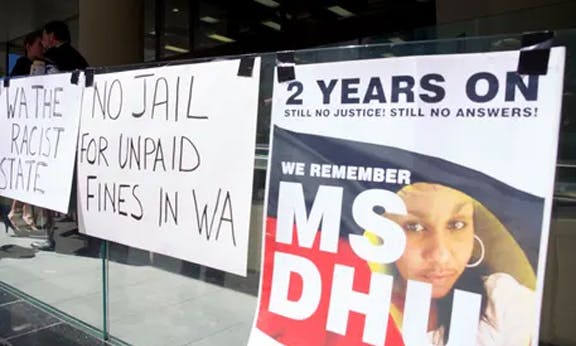‘Enough is enough’: resisting the criminalisation of poverty

Debbie Kilroy doesn’t mince words. “Poverty in Western Australia is a crime – and the state government is ensuring that Aboriginal women are being criminalised because they’re poor.”
Kilroy is head of prisoner advocacy group Sisters Inside, which last month launched a GoFundMe campaign to raise money for women imprisoned for unpaid fines.
The project initially aimed to raise $99,000 to pay the fines of 100 women. But within 24 hours they had smashed that target. After two weeks they had raised an astronomical $280,000.
Sisters Inside is working through the women currently jailed for fine non-payment, Kilroy told Red Flag. “Organisations have been contacting us on behalf of Aboriginal women, and we’re working with the prison registry to find out what their fines are, if they’ve got warrants, and paying them. And we’re also getting prisons to notify us when women are coming in.”
In Western Australia, the registrar of the Fines Enforcement Registry has the power to issue a special warrant allowing the state to jail people with unpaid fines. If you can’t pay, you do jail time.
A typical woman at risk “would usually be a single Aboriginal mother, who is struggling, living in poverty, the majority of the time trying to pay the fine off”, Kilroy said.
“[She] may have entered into a payment plan but just couldn’t keep up the payments because she has to make a decision between bread and milk, or pay a fine down. Or you’ve got women who are homeless, couch surfing, and just not surviving. We’ve got Aboriginal women with severe mental health issues, who don’t even understand what’s happened … We have Aboriginal mothers and their children in domestic violence shelters trying to escape violence who just can’t afford to pay the fines. These are the women we’re talking about.”
According to a 2016 report from the Office of the Inspector of Custodial Services, an average of 803 people were imprisoned for fine default each year between 2006 and 2015 in Western Australia. Aboriginal women are the most likely to be locked up on this basis.
Sisters Inside’s clients include a mother of three who felt unable to call police about her domestic violence situation for fear of being arrested for a $3,100 unpaid fine debt. Another is a 22-year-old woman pregnant with her second child facing jail for a $2,456 debt.
One of the most damning cases is that of 22-year-old Yamatji woman Ms Dhu, who in 2014 was imprisoned in the South Hedland lockup in Western Australia’s north for fines totalling $3,622. In what the coroner described as “inhumane treatment”, Ms Dhu was left for three days in extreme pain suffering from septicaemia and pneumonia, with no access to medical treatment. She later died in hospital.
Coroner Ros Fogliani made numerous recommendations in her report on the case, including that dedicated lockup keepers be present at stations where detainees are being held, mandatory training for lockup workers, cultural competency training for police and an end to the system of special warrants that lead to imprisonment for unpaid fines.
The state Labor government pledged to change the law in line with the coroner’s recommendations before winning the 2017 election. So far, this has not happened.
“Ms Dhu died four years ago. She called [police] for a domestic violence incident for her protection, but they arrested her and she was killed in the watch-house after being in agony for three days”, says Kilroy. “The laws are still not changed, there was a coronial inquest into her murder two years ago with findings from the coroner that stated clearly that the laws needed to change, and yet both [successive state] governments … have dragged their feet. We say enough is enough.”
Alira Kelly-Ryder recently came dangerously close to becoming another statistic. The Perth woman had $3,744 of unpaid fines for driving and dog registration offences. After sticking conscientiously to a payment plan, she lost her job and missed two payments. When Kelly-Ryder called the Fines Enforcement Registry to rearrange her payments, she was given an ultimatum: pay up or spend a week in jail.
She told ABC News, “I had the kids lock the doors, shut the curtains. That frightened me … They could take me right there on the spot in front of my children and take me to prison. I didn't drive to the shop, I didn’t leave the house, I got my friend to buy milk and bread.”
Kelly-Ryder is a close relation of Ms Dhu. For her, the consequences of fine default are all too real. She was fortunate to link up with Sisters Inside and has had her fine paid off. But for Kilroy, it’s a story that is repeated over and over. “If you have no money and you’re told in a letter to hand yourself in, or that if the cops pick you up you’re going to be arrested, it seems official and women feel defeated … They just accept that as part of their life: this will happen and their kids will be removed.”
Sisters Inside’s GoFundMe campaign continues to attract donations. Kilroy says she would love to get all women out of prison for fine default, but she also has a larger goal.
“We have to change the laws, we have to end the situation where people are criminalised and sent to prison because they can’t pay a fine. Poverty should not be a crime – it’s one of the worst examples of capitalism that you can see.”